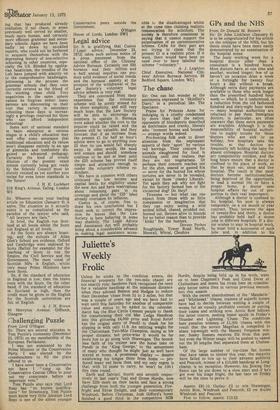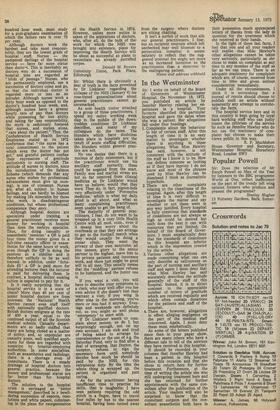From Dr Donald M. Bowers Sir: Dr John Linklater (January
6) is to be congratulated for his article on the collapse of the NHS, but his thesis could have been more easily demonstrated by an examination of the hospital scene.
The basic working week for a hospital doctor other than a consultant is a hundred hours. Most doctors have, at one time and another, worked longer; few of us haven't on occasion done a week or a fortnight for twenty four hours a day without a break. Although extra duty payments are available to those who work longer than the prescribed hundred hour week — which, be it understood, is a reduction from the old fashioned hundred and sixty-eight hour week — many hospital authorities are reluctant to pay them. Immigrant doctors, in particular, are often unaware that these extra payments arc available. Although it is the responsibility of hospital authorities to supply locums for those 'doctors who are sick or on holiday, few hospitals take the trouble, so that doctors are frequently left holding the baby for absent colleagues. Hospital doctors are compulsorily resident, and the long hours ensure that a doctor is confined to his place of work, so that he must eat, sleep and live hospital. The result is that most doctors become institutionalised; being deprived of the opportunity to lead a normal life or have a proper home, a doctor sees hospital affairs far out of proportion to their real importance. Although a doctor is confined to his hospital, his post is always temporary, on a six month or year contract. Thus, between the ages of twenty-five and thirty, a doctor has probably held half a dozen jobs in different hospitals. If a doctor wishes to stay in hospital work, he must hold a succession of such jobs and, in addition to his hundred hour week, must study for a post-graduate examination of which the failure rate is over 70 per cent.
Although doctors work the hardest and take most responsibility, they are the lowest grade of hospital staff. Nurses — the pampered darlings of the hospital service — have far more status than docto-s. This is inevitably so; doctors woo do a succession of hospital jobs are regarded as " birds of passage." Nurses, who are permanently employed, see a succession of doctors come and go, so that the individual doctor is regarded more or less as an intruder. Although nurses work a forty hour week as opposed to the doctor's hundred hour week, and, although nurses have a greater hourly rate of pay than doctors while possessing far less ability and taking far less responsibility, the myth is sedulously fostered that nurses, and nurses alone, " care about the patient." Thus, the Confederation of Health Service Employees stated at its 1972 conference that "the nurse has a total commitment to the patient which even the doctor has not got," and grateful patients confine their expressions of gratitude exclusively to nursing staff. The attitude of nurses to doctors, since the introduction of the Salmon Scheme (which demands that any nurse who wishes for professional advancement must give up nurs ing), is one of contempt. Nurses are, after all, subject to human failings, and can hardly be blamed for making life miserable for those who work in disadvantageous conditions, but whose professional competence they envy.
Although hospital doctors are specialists under training, a general practitioner receives more money for working in hospital than does the embryo specialist.
Thus, for doing casualty or anaesthetic ' sessions ' a GP is paid four times the money given to a full-time casualty officer or anaes thetist for the same hours of work, even though the GP is doing the sessions as a sideline and is therefore unlikely to be as well trained. In addition, under 'Sche dule 63' a GP is paid more for attending lectures than the lecturer is paid for delivering them. In contrast, a hospital doctor seeking tuition is expected to pay for it. Is it really surprising that the hospital service is in a state of chaos? More than 40 per cent of junior hospital doctors are from overseas; the ' National ' Health Service cannot even staff itself with nationally qualified doctors. British doctors emigrate at the rate of 400 a year, equal to the combined output of all the Scottish medical schools. Casualty depart ments are so badly staffed that many are being closed as a matter of policy, and, so unpopular are casualty posts, well qualified appli cants for them are regarded with suspicion by hospital-employing authorities. In some specialties, such as anaesthetics and radiology, there is a shortage even of consultants. There is a steady drainage of hospital doctors into general practice, because the money and professional status are far better than for hospital doctors.
The solution to the hospital crisis is envisaged as 'better management,' described in bewildering succession of reports, resolutions and white papers, culminating in the plans for reorganisation of the Health Service in 1974. However, unless more notice is taken of the aspirations of doctors, who, after all, do the bulk of the work for which the NHS was brought into existence, plans for improving the Health Service will be about as successful as plans to resuscitate an already putrefied corpse.
Donald M. Bowers University Union, Park Place, Edinburgh



































 Previous page
Previous page